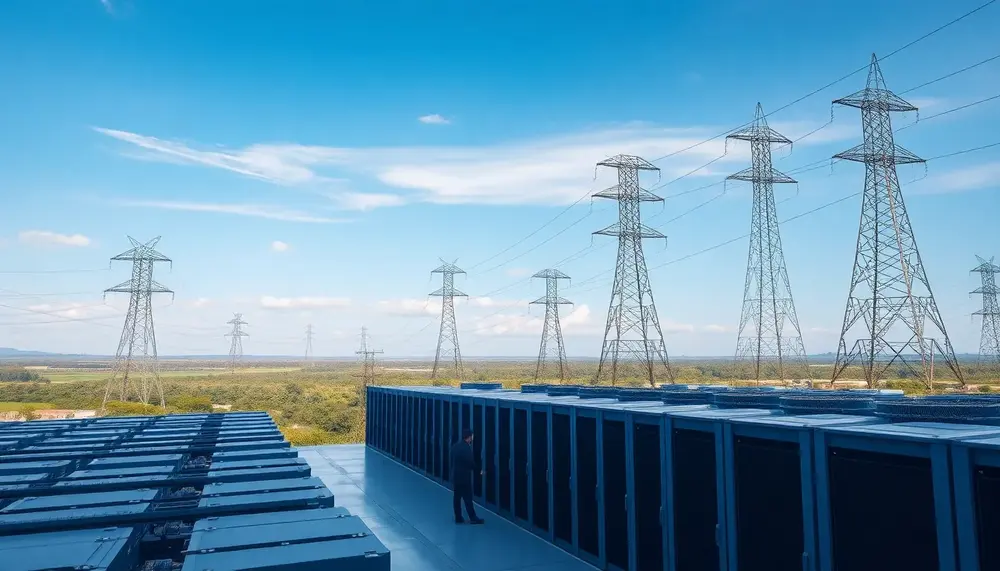Table of Contents:
Pakistan Provides 2,000 MW of Power for Bitcoin Mining and AI Centers
According to CVJ.CH, Pakistan has announced a major infrastructure initiative to allocate 2,000 megawatts (MW) of surplus energy for the development of Bitcoin mining farms and AI data centers. This amount represents approximately 4% of the country's total energy capacity and is sufficient to supply small nations such as Luxembourg. The electricity will primarily come from underutilized power plants that have so far remained idle. The initiative is part of a broader plan to modernize and digitize Pakistan's economy, with the newly established Pakistan Crypto Council (PCC) coordinating the efforts.
The project aims to build large mining centers in its first phase, operated by private investors but regulated by the government. Simultaneously, data centers for AI applications will be established. Pakistan positions itself as a regional innovation hub, seeking to catch up with countries like the UAE and India. The government is also working on creating the Pakistan Digital Assets Authority (PDAA), a new regulatory body to oversee crypto exchanges, wallets, tokenized platforms, and mining activities. Licensing for mining farms and tax incentives are also planned.
Get $500 free Bitcoin mining for a free testing phase:
- Real daily rewards
- 1 full month of testing
- No strings attached
If you choose to buy after testing, you can keep your mining rewards and receive up to 20% bonus on top.
A key aspect of the initiative is the integration of renewable energy sources, such as solar and hydropower, into mining operations. This is intended to improve the industry's image and enable sustainable innovation. Analysts interpret Pakistan's move as a strategic signal to investors and tech companies, demonstrating that Bitcoin mining can be used as an economic policy tool rather than being associated solely with instability or energy waste. Observers compare this step to similar initiatives in El Salvador, Kazakhstan, and the United Arab Emirates.
| Key Figures | Details |
|---|---|
| Allocated Power | 2,000 MW |
| Share of National Capacity | 4% |
| Regulatory Body | Pakistan Digital Assets Authority (PDAA) |
- Monetization of surplus energy
- Attraction of international investment
- Development of digital infrastructure
- Promotion of renewable energy in mining
"Mining ultimately represents the most efficient method for monetizing surplus energy." (CVJ.CH)
Summary: Pakistan is dedicating 2,000 MW of surplus energy to Bitcoin mining and AI centers, aiming to modernize its economy, attract investment, and promote sustainable innovation through regulatory reforms and renewable energy integration. (Source: CVJ.CH)
Pakistan Launches State-Supported Bitcoin Mining with 2,000 MW Surplus Energy
BTC Echo reports that Pakistan is taking a leading role in state-level crypto adoption by utilizing 2,000 MW of surplus energy for Bitcoin mining and AI centers. The initiative, supported by the Ministry of Finance and coordinated by the Pakistan Crypto Council, is part of a comprehensive digital strategy. The first phase will supply energy to data centers and crypto farms, with the government expecting billions in foreign investment and the creation of new jobs.
In the second phase, the energy supply for mining facilities will increasingly shift to renewable sources, particularly solar and wind power, to reduce CO2 emissions and boost public acceptance. The Ministry of Finance has also introduced tax incentives for AI infrastructure and customs exemptions for Bitcoin mining hardware. A central element of the digital strategy is the establishment of the Pakistan Digital Assets Authority, which will regulate digital asset trading, issue licenses for crypto exchanges and wallets, and oversee the use of stablecoins, DeFi applications, and other blockchain-based services.
According to the 2024 Global Crypto Adoption Index by Chainalysis, Pakistan ranks ninth globally in crypto adoption. The government’s measures are expected to further strengthen its position in the international crypto landscape.
| Key Measures | Details |
|---|---|
| Allocated Power for Mining | 2,000 MW |
| Tax Incentives | For AI infrastructure and mining hardware |
| Regulatory Authority | Pakistan Digital Assets Authority |
| Global Crypto Adoption Rank (2024) | 9th (Chainalysis) |
- Utilization of surplus energy for digital infrastructure
- Shift to renewable energy sources in mining
- Customs exemptions for mining hardware
- Regulation of digital assets and blockchain services
Summary: Pakistan is leveraging 2,000 MW of surplus energy for state-supported Bitcoin mining and AI centers, introducing tax incentives, customs exemptions, and a new regulatory authority to foster digital innovation and international investment. (Source: BTC Echo)
Sources:
















